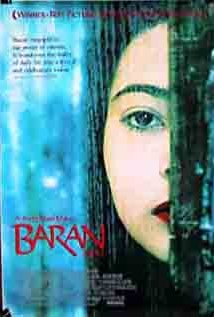
BARAN
Iran, 2001, 94 minutes, Colour.
Zahra Bahrani, Hossein Abedini.
Directed by Majid Majidi.
Baran is the fifth film of the noted writer-director Majid Majidi. He won a number of awards for his moving films about children, Children of Heaven, The Colour of Paradise. Once again he returns to children's themes, but this time the focus on an adolescent girl.
The film opens with comment about Afghan refugees during the '90s and over a million (those counted) in Iran. (The film Kandahar about Iranians and Afghan refugees also came out in 2001.)
The film is set mainly on a construction site in a city. Afghans are forbidden to be employed as workers. However, Memar, the foreman, employs a great number of them, concealing them from the inspectors. While he seems a taskmaster, he is actually kindly towards his workers, protecting the Afghans, befriending some of them personally, providing better conditions for their work. He has also taken under his wing, a son of a friend of his, Lateef, who buys the food and is the tea-boy. However, Latif is displaced by Rahman, the son of an injured worker.
Latif resents this but suddenly discovers that Rahman is actually a girl. He then becomes infatuated with her - from a distance. This love transforms his life, giving money to help the Afghan refugees, scarcely revealing himself to Rahman as in love with her, but helping her father and the family return to Afghanistan, a complete self-sacrifice.
The film makes vivid comment on the situation of the Afghan refugees. It shows ordinary daily life on a construction site in Iran. It offers deep insights into the nobler aspects of human nature. A moving experience.
1. The impact as an Iranian film? The Iranian film tradition, for so long, creating masterpieces, recognition throughout the world? A film industry of humanity?
2. The work of the director, his humanity, focus on children? On adolescents?
3. The location photography, the building site, the city, the drab conditions for the workers, the surrounding countryside? The focus on the characters, close-ups, interactions – suggestions of emotion? Visual symbols? The musical score?
4. Iran and Afghanistan, the huge number of refugees, trying to get work in Iran, forbidden by law to work? The possibilities for repatriation?
5. The portrayal of action, work, the building, the serving of food? Life at home? The building site, injuries, the special jobs? Few words – and with Baran not saying any word throughout the film?
6. The building site, the work, the foreman and his sympathy for the Afghans, shielding them from the inspectors? The injury, Baran’s father and the need for her to work? The need for the disguise?
7. Latif, his age, not doing so much work, his place on the site, with the other men, the details of his life? The injury, Rahman having to work, her father and the needs, financial support? Latif and his reaction, resentment? Playing tricks on Rahman? The discovery of the truth? The loss of resentment? The attraction? His change, the inequalities, helping Rahman, picking up the fruit, attentiveness – but almost at a distance? A growing tenderness?
8. Rahman, her character, love her father, going to work, the difficulties, the disguise, carrying the food? The reactions of Latif, his tricks on her? Her revealing the truth? Her attitudes towards him?
9. The inspectors, the difficulties of the Afghans, their being dismissed from their work?
10. Latif, his response, helping? His sacrifice ease money for the family? The buildup to the family leaving, the packing, Baran on the track?
11. The truth of Latif’s love, watching her go, the hat and the hairpin? His contemplating the curtains? The departure, her footprint in the sand, the rain falling on the footprint – and Baran meaning ‘rain’?
12. The quality of the film, its realism, simplicity, beauty and humanity – and an illustration of the Iranian spirit?